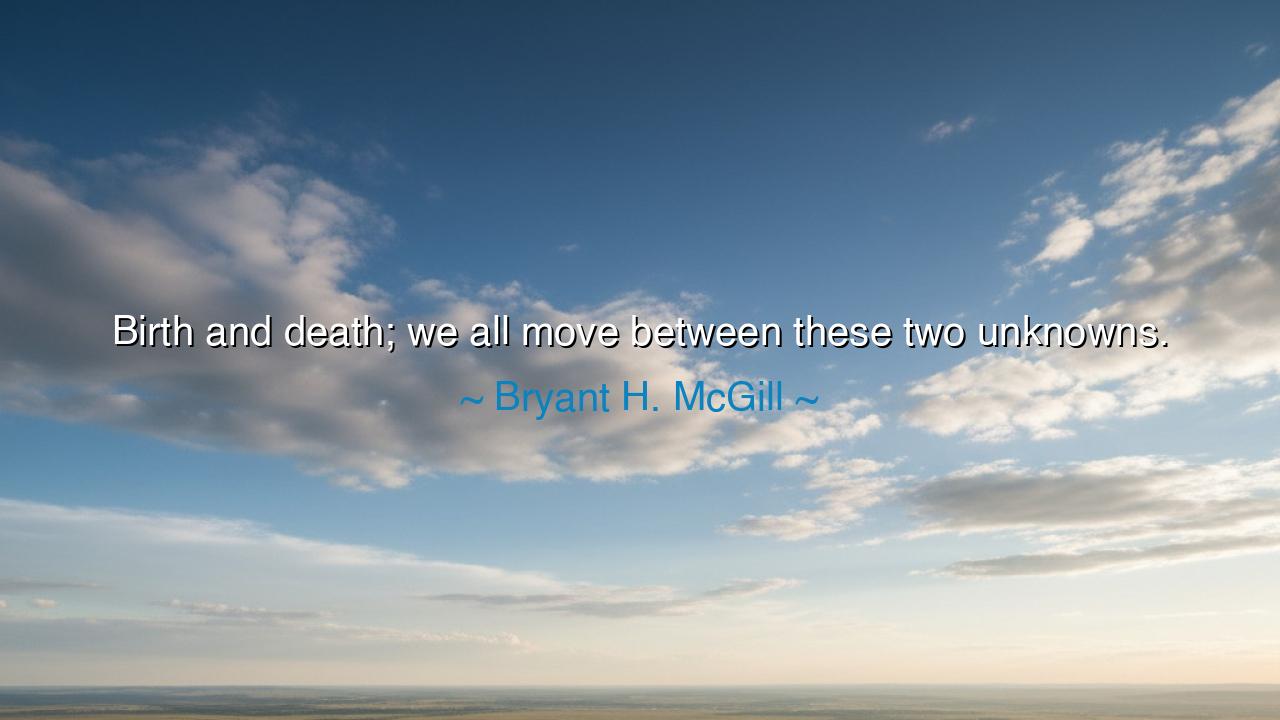
Birth and death; we all move between these two unknowns.






“Birth and death; we all move between these two unknowns.” Thus spoke Bryant H. McGill, a modern philosopher and poet of the human condition, whose words echo like an ancient bell across the ages. In this simple phrase, he captures the essence of all existence—the mystery of beginnings and the mystery of endings, the two gateways through which every soul must pass. Between these doors lies our brief sojourn on Earth, a fragile thread of consciousness stretched between the infinite darkness from which we came and the infinite light—or shadow—to which we return.
McGill’s quote, though born in our time, carries the tone of timeless wisdom. It reminds us that we are all travelers upon the same path, bound by the same wonder and uncertainty. No one remembers the hour of their birth, and none can foretell the hour of their death. These are the two sacred veils that conceal the full design of existence. And yet, it is between them—within the narrow space of a lifetime—that all love, joy, struggle, and meaning unfold. The ancients called this space the “journey of the soul,” and they taught that to live well between these unknowns is the truest form of wisdom.
The philosophers of old—Socrates, Lao Tzu, and the Buddha—each in their way spoke of these mysteries. Socrates, awaiting his death, told his students that no wise man fears it, for death is either a peaceful sleep or a new awakening. Lao Tzu said that life and death are merely two aspects of the same eternal movement, like the rising and setting of the sun. And the Buddha taught that all forms arise and pass away, and that peace comes from accepting the impermanence of all things. McGill’s insight stands among theirs: to be born is to enter uncertainty, and to die is to return to it. Between them lies the art of living consciously, with reverence for the moment and courage for the mystery.
Consider the story of Marcus Aurelius, emperor and philosopher, who ruled Rome yet kept his heart humble before life’s brevity. Each dawn he reminded himself: “You could leave life right now. Let that determine what you do and say and think.” Though surrounded by power, he lived with awareness that both birth and death were beyond his command. He sought instead to govern what lay between—to act justly, to love his people, and to meet fate without bitterness. His life became a meditation upon McGill’s truth: we are given nothing but the present, a fleeting bridge suspended between mysteries.
This understanding should not fill us with fear, but with gratitude. For if life is truly a passage between two unknowable realms, then every heartbeat, every sunrise, every act of kindness becomes precious beyond measure. The unknowns give meaning to the known. The flower’s beauty is greater because it will fade; the child’s laughter sweeter because it will someday be memory. In this awareness lies not despair, but awakening—the realization that the impermanence of life is what gives it shape, urgency, and light.
McGill’s quote also whispers of humility. Between birth and death, we learn that no wealth or power can alter the boundaries set by time. All stand equal before the mystery—the pauper and the king, the scholar and the child. What endures is not the length of the journey but the depth of the soul’s growth within it. Each act of love, each moment of compassion, each pursuit of truth leaves an imprint that outlives the body and touches the eternal. To live with this knowledge is to live wisely; to forget it is to wander lost among illusions.
The lesson, then, is both simple and profound: live fully in the space between the unknowns. Do not waste your brief breath in fear of what lies before or beyond. Instead, fill the middle with purpose. Love without restraint. Forgive without hesitation. Learn, build, and give, for each act of goodness illuminates the corridor between birth and death. When the final moment comes, you will not curse the darkness, for your life will have been a light within it.
So remember, my listener: you were born without knowing, and you will die without knowing—but you are alive to seek, to feel, to grow. This is your sacred charge. Between those two unknowable shores, live as though each day were both the first and the last. And when you reach the second gate, may you step through it not with fear, but with wonder—knowing that though all things end, the journey of the spirit continues beyond the veil of the unknown.






AAdministratorAdministrator
Welcome, honored guests. Please leave a comment, we will respond soon